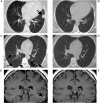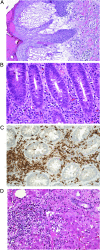Cancer regression and autoimmunity induced by cytotoxic T lymphocyte-associated antigen 4 blockade in patients with metastatic melanoma - PubMed (original) (raw)
Clinical Trial
. 2003 Jul 8;100(14):8372-7.
doi: 10.1073/pnas.1533209100. Epub 2003 Jun 25.
James C Yang, Richard M Sherry, Patrick Hwu, Suzanne L Topalian, Douglas J Schwartzentruber, Nicholas P Restifo, Leah R Haworth, Claudia A Seipp, Linda J Freezer, Kathleen E Morton, Sharon A Mavroukakis, Paul H Duray, Seth M Steinberg, James P Allison, Thomas A Davis, Steven A Rosenberg
Affiliations
- PMID: 12826605
- PMCID: PMC166236
- DOI: 10.1073/pnas.1533209100
Clinical Trial
Cancer regression and autoimmunity induced by cytotoxic T lymphocyte-associated antigen 4 blockade in patients with metastatic melanoma
Giao Q Phan et al. Proc Natl Acad Sci U S A. 2003.
Abstract
Cytotoxic T lymphocyte-associated antigen 4 (CTLA-4) is a critical immunoregulatory molecule (expressed on activated T cells and a subset of regulatory T cells) capable of down-regulating T cell activation. Blockade of CTLA-4 has been shown in animal models to improve the effectiveness of cancer immunotherapy. We thus treated 14 patients with metastatic melanoma by using serial i.v. administration of a fully human anti-CTLA-4 antibody (MDX-010) in conjunction with s.c. vaccination with two modified HLA-A*0201-restricted peptides from the gp100 melanoma-associated antigen, gp100:209-217(210M) and gp100:280-288(288V). This blockade of CTLA-4 induced grade III/IV autoimmune manifestations in six patients (43%), including dermatitis, enterocolitis, hepatitis, and hypophysitis, and mediated objective cancer regression in three patients (21%; two complete and one partial responses). This study establishes CTLA-4 as an important molecule regulating tolerance to "self" antigens in humans and suggests a role for CTLA-4 blockade in breaking tolerance to human cancer antigens for cancer immunotherapy.
Figures
Fig. 1.
Computed axial tomography scans illustrating pretherapy disease status (Left) and complete responses (Right) for patient 13 (A and B) and patient 11 (C_–_F). Arrows show sites of metastases.
Fig. 2.
Histopathologic analyses of selected patients experiencing autoimmune events. (A) Skin biopsy (patient 2) showing severe dermatitis with epidermal spongiosis, papillary dermal edema, and a prominent inflammatory infiltrate in both the superficial and deep dermis. (B) Colon biopsy (patient 9) illustrating severe colitis with infiltration of the lamina propria with neutrophils, lymphocytes, monocytes, plasmacytes, and eosinophils suggestive of autoimmune reactions. Neutrophils and lymphocytes also infiltrate the crypts; numerous mitotic figures are seen in the epithelial cells lining the crypts. (C) Immunohistochemistry of the colon biopsy (patient 9) reveals that the majority of cells are CD3+. (D) Liver biopsy (patient 12) showing areas of necrosis and lobular inflammation with (mainly) lymphocytic infiltration into the portal triad. (Magnifications: A, ×10; B_–_D, ×20.)
Similar articles
- CTLA-4 blockade: autoimmunity as treatment.
Kapadia D, Fong L. Kapadia D, et al. J Clin Oncol. 2005 Dec 10;23(35):8926-8. doi: 10.1200/JCO.2005.07.012. Epub 2005 Oct 3. J Clin Oncol. 2005. PMID: 16204008 No abstract available. - Autoimmunity in a phase I trial of a fully human anti-cytotoxic T-lymphocyte antigen-4 monoclonal antibody with multiple melanoma peptides and Montanide ISA 51 for patients with resected stages III and IV melanoma.
Sanderson K, Scotland R, Lee P, Liu D, Groshen S, Snively J, Sian S, Nichol G, Davis T, Keler T, Yellin M, Weber J. Sanderson K, et al. J Clin Oncol. 2005 Feb 1;23(4):741-50. doi: 10.1200/JCO.2005.01.128. Epub 2004 Dec 21. J Clin Oncol. 2005. PMID: 15613700 - Cytotoxic T lymphocyte-associated antigen 4 blockade in patients with metastatic melanoma: a new cause of uveitis.
Robinson MR, Chan CC, Yang JC, Rubin BI, Gracia GJ, Sen HN, Csaky KG, Rosenberg SA. Robinson MR, et al. J Immunother. 2004 Nov-Dec;27(6):478-9. doi: 10.1097/00002371-200411000-00008. J Immunother. 2004. PMID: 15534492 - CTLA-4 blockade increases antigen-specific CD8(+) T cells in prevaccinated patients with melanoma: three cases.
Yuan J, Ginsberg B, Page D, Li Y, Rasalan T, Gallardo HF, Xu Y, Adams S, Bhardwaj N, Busam K, Old LJ, Allison JP, Jungbluth A, Wolchok JD. Yuan J, et al. Cancer Immunol Immunother. 2011 Aug;60(8):1137-46. doi: 10.1007/s00262-011-1011-9. Epub 2011 Apr 5. Cancer Immunol Immunother. 2011. PMID: 21465316 Free PMC article. Review. - Antigens derived from melanocyte differentiation proteins: self-tolerance, autoimmunity, and use for cancer immunotherapy.
Engelhard VH, Bullock TN, Colella TA, Sheasley SL, Mullins DW. Engelhard VH, et al. Immunol Rev. 2002 Oct;188:136-46. doi: 10.1034/j.1600-065x.2002.18812.x. Immunol Rev. 2002. PMID: 12445287 Review.
Cited by
- GM-CSF and ipilimumab therapy in metastatic melanoma: Clinical outcomes and immunologic responses.
Kwek SS, Kahn J, Greaney SK, Lewis J, Cha E, Zhang L, Weber RW, Leonard L, Markovic SN, Fong L, Spitler LE. Kwek SS, et al. Oncoimmunology. 2015 Oct 29;5(4):e1101204. doi: 10.1080/2162402X.2015.1101204. eCollection 2016 Apr. Oncoimmunology. 2015. PMID: 27141383 Free PMC article. - Anti-pituitary antibodies and susceptible human leukocyte antigen alleles as predictive biomarkers for pituitary dysfunction induced by immune checkpoint inhibitors.
Kobayashi T, Iwama S, Sugiyama D, Yasuda Y, Okuji T, Ito M, Ito S, Sugiyama M, Onoue T, Takagi H, Hagiwara D, Ito Y, Suga H, Banno R, Nishikawa H, Arima H. Kobayashi T, et al. J Immunother Cancer. 2021 May;9(5):e002493. doi: 10.1136/jitc-2021-002493. J Immunother Cancer. 2021. PMID: 34011534 Free PMC article. - Anti-CTLA-4 (CD 152) monoclonal antibody-induced autoimmune interstitial nephritis.
Jolly EC, Clatworthy MR, Lawrence C, Nathan PD, Farrington K. Jolly EC, et al. NDT Plus. 2009 Aug;2(4):300-2. doi: 10.1093/ndtplus/sfp048. Epub 2009 Apr 28. NDT Plus. 2009. PMID: 25984021 Free PMC article. - Talimogene Laherparepvec in Combination With Ipilimumab in Previously Untreated, Unresectable Stage IIIB-IV Melanoma.
Puzanov I, Milhem MM, Minor D, Hamid O, Li A, Chen L, Chastain M, Gorski KS, Anderson A, Chou J, Kaufman HL, Andtbacka RH. Puzanov I, et al. J Clin Oncol. 2016 Aug 1;34(22):2619-26. doi: 10.1200/JCO.2016.67.1529. Epub 2016 Jun 13. J Clin Oncol. 2016. PMID: 27298410 Free PMC article. Clinical Trial. - Ipilimumab, vemurafenib, dabrafenib, and trametinib: synergistic competitors in the clinical management of BRAF mutant malignant melanoma.
Luke JJ, Hodi FS. Luke JJ, et al. Oncologist. 2013 Jun;18(6):717-25. doi: 10.1634/theoncologist.2012-0391. Epub 2013 May 24. Oncologist. 2013. PMID: 23709751 Free PMC article. Review.
References
- Bretscher, P. & Cohn, M. (1970) Science 169 1042-1049. - PubMed
- Schwartz, R. H. (1990) Science 248 1349-1356. - PubMed
- Brunet, J. F., Denizot, F., Luciani, M. F., Roux-Dosseto, M., Suzan, M., Mattei, M. G. & Goldstein, P. (1987) Nature 328 267-270. - PubMed
Publication types
MeSH terms
Substances
LinkOut - more resources
Full Text Sources
Other Literature Sources
Medical
Research Materials

